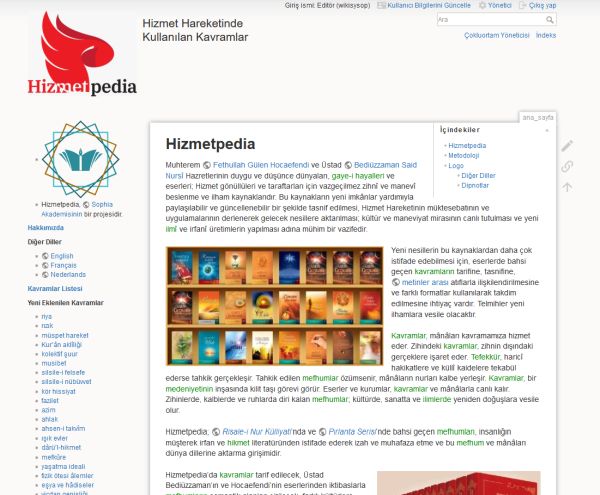We interviewed the president of the Sophia Academy in the Netherlands, Bahattin Ayyıldız, and the project editors about “Hizmetpedia,” an internet platform established with the aim of explaining and translating the terms used in the Hizmet Movement into world languages.
There are many dictionary and encyclopedia platforms on the internet. A new addition to these sites, which particularly attract the attention of young people, is “Hizmetpedia.” Every innovation arises from a need. How did Hizmetpedia come into being? Can you tell us its story?
About two years ago, we, along with our academic colleagues in the Netherlands, discussed 100 terms used in the Hizmet Movement during a five-week seminar program. Participants from different countries joined the program. Later, we expanded this list of terms to 600 and obtained the domain name “hizmetpedia.org.” Our website became active in February 2022, where we define 16 terms every month and then translate them into English and Dutch.
The list of terms consists of concepts used in the Hizmet Movement’s primary sources. We briefly describe these concepts, often referencing dictionaries and encyclopedias, and if there is a specific meaning attributed to a term by the Hizmet Movement, we mention it. Then, we establish a semantic framework by quoting excerpts from sources where this concept is used. Additionally, we create links to other concepts mentioned in each article.
The concepts are prepared in Turkish by an editorial team, translated into other languages, and added to the website after necessary corrections. Concepts are regularly reviewed by editors considering evaluations and comments, and necessary updates are made. Taking into account cultural nuances in different languages, adaptations are made, and references to reliable sources are provided for those who want more detailed information.
Currently, Hizmetpedia is published in Turkish, English, and Dutch. Will other languages be added to the site?
In the coming months, we plan to translate our site primarily into French and German. Our goal is to provide translations in approximately 20 world languages.
Who is the target audience of the site, and what will its scope be?
We aimed to create a resource that can be used by those who are dedicated to the Hizmet Movement and those curious about the concepts used in Hizmet. Those who want to explore the semantic fields of the concepts mentioned in the Risale-i Nur Collection and Fethullah Gülen Hodjaefendi’s books in different languages can benefit from the site.
Especially Hizmet volunteers conducting guidance and dialogue activities in different countries and languages can use the concepts described on the site. Our friends who translate Hizmet literature into world languages can also benefit from the site.
For now, we plan to define about 600 concepts in 20 languages. Later, we can increase this number according to demand.
How can young people benefit from this site in particular?
While reading the Risale-i Nur Collection and Hodjaefendi’s books, they can search for the concepts they frequently encounter and read how these concepts are defined on our site. They can examine their uses in different contexts and notice nuances. They can study their usage in languages other than Turkish, expanding their understanding of these concepts in their minds and hearts. In their works in various media and formats, they can make use of these concepts.
Can you provide information about the Sophia Academy, which played a leading role in the establishment of the site? What other projects and activities do you have?
The Sophia Academy, which we describe as “Huis Der Wijsheid voor Islamstudies en Educatie” (House of Wisdom for Islamic Studies and Education), is a foundation established in 2018 in Rotterdam by our colleagues who specialize in different Islamic disciplines. We have two main goals:
- To offer Islamic sciences at an academic level to Muslims living in the Netherlands and other Western countries based on reliable sources. We aim for Muslims to learn and internalize their own traditions and to contribute actively and consciously to the democratic and pluralistic culture in their host countries. We hope they will contribute to this culture while respecting everyone’s lifestyle.
- To provide answers to questions about Islam for people living in Western countries. Anyone interested can discuss a topic related to Islam with our experts at our foundation. We aim to establish this communication with respect for everyone’s lifestyle, preserving our cultural richness, and nurturing a culture of coexistence. These sentiments and thoughts constitute the basic philosophy of the Sophia Academy.
In the context of the goals mentioned above, our foundation continues its activities. We have prepared a three-year Religious Sciences (Theology) Education Program, and we have been offering regular classes for about two years. Our foundation also hosts various programs that explain Islam from different aspects to non-Muslims.
We organize seminars on different topics every month. We provide information in advance about the subject and our expert guests to attendees. In this way, we have created very productive and high-level discussion platforms. After the seminars held at our foundation, we offer refreshments and facilitate very fruitful exchanges of ideas. Our foundation is committed to continuing these seminars, which make serious contributions to our intellectual life.
Furthermore, every month, invited experts give lectures on scientific subjects. During the pandemic, we had to suspend our face-to-face activities, but we continued our work by moving our theology program, seminars, and lectures to online platforms. In the first year, we had approximately 100 students from about 30 countries worldwide. In the second year, we had a similar number of students. As we approach our third year, with the increasing number of students and our expanding teaching staff, we strive to serve Islam and humanity.
Within our foundation, we also have a jurisprudence committee that works on solutions to current problems. Our expert teachers come together at certain intervals for discussions.
In addition, we organize some certificate programs. In previous terms, we had certificate programs such as The Tenets of Belief, Hadith Studies, Applied Qur’anic Studies, and Introduction to Alevi Studies. In the upcoming term, under the title “Seeds of Truth,” we will start a certificate program inspired by the works of Bediüzzaman Said Nursi, focusing on faith and creed. Those interested can find the necessary information on our website. In addition to Hizmetpedia, which is an important project for understanding the concepts mentioned in the Risale-i Nur Collection and Hodjaefendi’s books, our publishing house, primarily aiming to publish the academic works of our teachers who teach in the theology program, will also start its services soon.
For more detailed information, you can visit our website: https://academysophia.nl/
Hizmetpedia: https://hizmetpedia.org/




